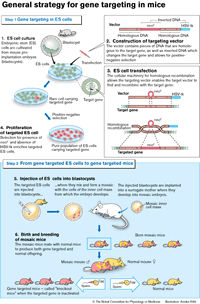Cells adapt ultra-rapidly to zero gravity
mammalian cells fully adapt to zero gravity in less than a minute. Real-time readings on the International Space Station (ISS) reveal that cells compensate ultra-rapidly for changes in gravitational conditions. This new discovery was achieved by an international team headed by scientists at the University of Zurich.

The ESA astronaut Samantha Cristoforetti conducting the experiment in the BIOLAB of the COLUMBUS Module on the ISS.
NASA
Mammalian cells are optimally adapted to gravity. But what happens in the microgravity environment of space if the earth’s pull disappears? Previously, many experiments exhibited cell changes – after hours or even days in zero gravity. Astronauts, however, returned to Earth without any severe health problems after long missions in space, which begs the question as to how capable cells are of adapting to changes in gravity. Based on real-time readings on the ISS, UZH scientists can now reveal that cells are able to respond to changes in gravitational conditions extremely quickly and keep on functioning. Therefore, the study also provides direct evidence that certain cell functions are linked to gravity.
Test setup and measurement on the ISS
In contrast to space experiments, where analyses are conducted afterwards on Earth, the team headed by UZH scientists Oliver Ullrich and Cora Thiel opted for a different path. They geared their experimental design towards conducting direct measurements in space: From thawing the test cells to the measurements themselves, ESA astronaut Samantha Cristoforetti performed all the operations directly in the lab on the ISS. The data gathered on the space station was then transmitted to Earth. Rigorous internal and external controls excluded any influence other than gravity.
Cell adaptation in 42 seconds
The research team used the so-called oxidative burst – an old evolutionary mechanism to kill off bacteria via defense cells – to study how rat cells responded to changes in gravity. With the aid of centrifuges, Cristoforetti altered the gravitational conditions on the ISS, which enabled the team in the control center to track how the cells reacted. “Ultra-rapidly,” explains Oliver Ullrich, a professor from the Institute of Anatomy at the University of Zurich. “Although the immune defense collapsed as soon as zero gravity hit, to our surprise the defense cells made a full recovery within 42 seconds.” For Ullrich and Thiel, the direct evidence of a rapid and complete adaptation to zero gravity in less than a minute begs the question as to whether previous cell changes measured after hours or days were also the result of an adaptation process.
Good news for astronauts
“It seems paradoxical,” says Thiel: “Cells are able to adapt ultra-rapidly to zero gravity. However, they were never exposed to it in the evolution of life on Earth. Therefore, the results raise more questions regarding the robustness of life and its astonishing adaptability.” In any case, as far as Ullrich is concerned the result of the ISS experiment is good news for manned space flight: “There’s hope that our cells are able to cope much better with zero gravity than we previously thought.”



















































